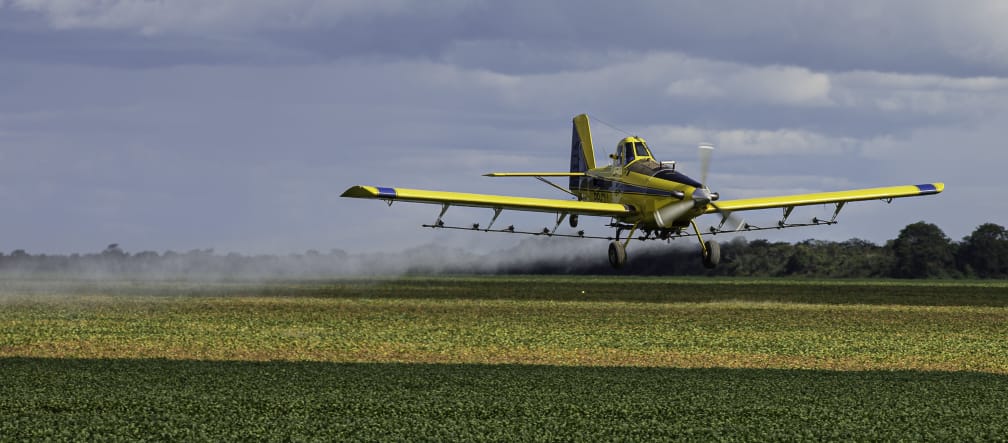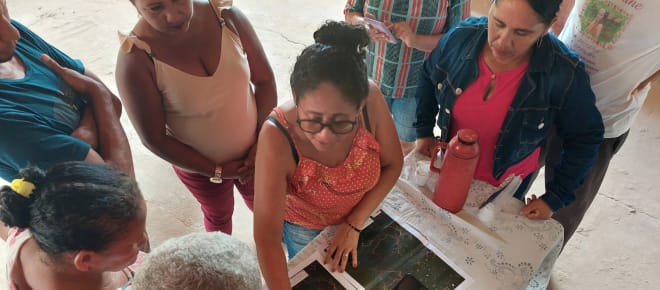
Brazil: Ban the aerial spraying of pesticides!
In Maranhão in northeastern Brazil, industrial soy producers are waging chemical warfare against local farming communities, using planes and drones to spray pesticides over people, their vegetable fields, palm forests and drinking water sources. Tell the Brazilian government and authorities to ban aerial spraying.
News and updatesTo: Brazilian Minister of Agriculture and Livestock, Carlos Henrique Baqueta Fávaro; Minister of the Environment, Marina Silva; Minister for Human Rights and Citizenship, Silvio Luiz de Almeida; Governor of Maranhão, Carlos Brandão
“Ban the aerial spraying of pesticides in Brazil and take action to protect the people of Timbiras.”People in the Timbiras district of Maranhão state complain that soy producers are using pesticides as a weapon against them to drive them off their land. The soy industry has expanded rapidly in the region over the past three years, and this year spraying by planes and drones has increased.
The toxic fog settles not only on the soy plantations, but also on surrounding crops and livestock, palm and river forests, waterways and even on people’s homes and bodies. The toxins contaminate everything they touch.
The pesticides are destroying the food security of farming families and endangering their health. Women, men, the elderly and children suffer from skin lesions, headaches, vomiting, dizziness, shortness of breath, coughing and other symptoms of poisoning.
Public health facilities are scarce in the countryside, forcing victims to travel to urban hospitals, where they are told they have scabies or a viral infection.
The Council for the Defense of Human Rights of the State of Maranhão (CEDDH) visited Timbiras and confirmed the seriousness of the situation.
Similar pesticide spraying attacks are taking place in other Brazilian states. Laboratory analyses by environmental and human rights organizations confirm the contamination of the water sources of traditional peoples and communities by agricultural toxins.
In the EU, aerial spraying of pesticides has been banned since 2009 due to proven serious risks to humans and the environment.
Please join us in calling on the governments of Brazil and Maranhão state to urgently ban aerial spraying – as has already been done in the Brazilian state of Ceará.
Use and impact of agrochemicals in Brazil
Brazil is the world's largest importer of pesticides. Chemical companies from Europe such as Bayer, BASF and Syngenta, DuPont from the US and China’s Lier Chemical sell increasing quantities of agricultural toxins to the South American country, including many highly dangerous products that are banned in Europe. 720,870 tons of pesticides were used in Brazil in 2021, more than half of them on soy.
In the last five years, some 6,230 new pesticides have been approved in Brazil – an average of more than 500 per year. People, animals and plants, air, soil, drinking water, water bodies and ecosystems are being poisoned with a cocktail of countless different pesticides. The effects are virtually unmonitored and barely studied.
Every year, thousands of people are poisoned by the agricultural industry, although the number of unreported cases is much higher. Eventually, the toxins find their way to us. Many agricultural products imported into the EU from Brazil contain high levels of pesticides.
In Timbiras, people complain that they are being sprayed with a cocktail of at least seven different pesticides. One of the poisons they have identified is the herbicide Disparo from Lier Chemical. It contains the active ingredients picloram (pyridinecarboxylic acid) and 2,4-D-dimethylamine (aryloxyalkanoic acid). According to the manufacturer’s package insert, the symptoms of poisoning caused by these active ingredients match those of the farmers.
In addition, agrochemical companies also sell large quantities of seeds, including genetically modified seeds such as Bayer’s Roundup Ready corn and Roundup Ready soy. These seeds have been made resistant to the herbicide glyphosate, which is contained in Bayer’s Roundup and other products. In practice, the cultivation of genetically modified crops involves the use of particularly large quantities of pesticides.
Environmental and human rights organizations file complaint against Bayer
An alliance of six environmental and human rights organizations from Argentina, Bolivia, Brazil, Germany and Paraguay has filed a complaint against Bayer AG with the Organization for Economic Cooperation and Development (OECD). They want to hold the company accountable for the severe impacts of industrial agriculture in South America.
The accusation: Bayer violates the OECD guidelines for multinational enterprises. The company promotes an agricultural model in South America that leads to food insecurity, water scarcity, extreme deforestation, loss of biodiversity, serious health impacts and land conflicts with Indigenous and peasant communities.
The company has failed to respond adequately to the serious human rights and environmental risks directly linked to its business model in the region. According to Misereor, the effects of the use of genetically modified seeds and pesticides have not been monitored, nor have effective measures been taken to prevent and mitigate them.
Further information:
Articles and video clip about the pesticide spraying in Timbiras in Portuguese:
- Agrotóxicos Mata/Rede de Agroecologia do Maranhão (Rama), 8.4.2024. Denúncia: Aroguerra química contra comunidades tradicionais: https://contraosagrotoxicos.org/guerra-quimica-contra-comunidades-tradicionais/
- Amazonia Real, 22.5.2024. Ataques químicos estão mais intensos e agressivos no Maranhão: https://amazoniareal.com.br/ataques-quimicos-estao-mais-intensos-e-agressivos-no-maranhao/
- Amazonia Real, 15.4.2024. ‘Guerra química’ intoxica comunidades no Maranhão: https://amazoniareal.com.br/guerra-quimica-intoxica-comunidades-no-maranhao/
Atlas of agricultural poisons in Brazil:
- Fundação Heinrich Böll, 12.2023. Atlas dos agrotóxicos. Fatos e dados do uso dessas substâncias na agricultura 2023: https://br.boell.org/sites/default/files/2024-01/atlas-do-agrotoxico-2023-revisao2024.pdf
To: Brazilian Minister of Agriculture and Livestock, Carlos Henrique Baqueta Fávaro; Minister of the Environment, Marina Silva; Minister for Human Rights and Citizenship, Silvio Luiz de Almeida; Governor of Maranhão, Carlos Brandão
Ladies and Gentlemen,
According to affected communities, soy producers in the Timbiras district of eastern Maranhão, a region where agribusiness is expanding rapidly, have been using pesticides as a chemical weapon for at least three years.
Local people complain that the pesticides, sprayed by planes and drones, are intended to drive them from their ancestral lands, which they have cultivated for more than a century.
The toxic fog settles not only on the soy plantations, but also on surrounding crops and livestock, palm and river forests, waterways, drinking water sources, and even on people’s homes and bodies.
They suffer from skin burns, nausea, headaches, breathing difficulties, and the constant fear of being attacked by pesticides again at any moment.
They are also at risk of starvation and thirst as their crops are destroyed by the poisons and their drinking water is contaminated.
In the face of this catastrophic situation and extreme violence, we urge you to seek legal means to ban aerial spraying in Brazil.
We also demand that the recommendations of the report of the Council for the Defense of Human Rights of the State of Maranhão (CEDDH), which visited Timbiras in April 2024 and assessed the consequences of the violations on the ground, be taken into account and urgently implemented.
The report contains concrete recommendations to meet the short, medium and long term demands of the affected families and provide a lasting solution to the violations. The report is available here: https://drive.google.com/file/d/1w9hzROUtxCXgoaHplHeCGXAOUmDnMdKs/view
Yours faithfully,
Conselho Estadual de Defesa dos Direitos Humanos do Maranhão, 3.2024. RELATÓRIO TÉCNICO DE INSPEÇÃO IN LOCO N° 001/2024: https://drive.google.com/file/d/1w9hzROUtxCXgoaHplHeCGXAOUmDnMdKs/view
Lopes, Helena Rodrigues, 2023. VIVENDO EM TERRITÓRIOS CONTAMINADOS: um dossiê sobre agrotóxicos nas águas do Cerrado: https://campanhacerrado.org.br/images/biblioteca/dossie-agrotoxicos-aguas-cerrado.pdf
Official Journal of the European Union. DIRECTIVE 2009/128/EC OF THE EUROPEAN PARLIAMENT AND OF THE COUNCIL of 21 October 2009 establishing a framework for Community action to achieve the sustainable use of pesticides: https://eur-lex.europa.eu/legal-content/EN/TXT/HTML/?uri=CELEX%3A32009L0128
Reporter Brasil, 16/6/2023. Depois do CE, dez estados podem proibir aplicação de agrotóxicos por aviões: https://reporterbrasil.org.br/2023/06/depois-do-ce-dez-estados-podem-proibir-aplicacao-de-agrotoxicos-por-avioes/
Heinrich Böll Foundation, January 11, 2024. Pestizide: Brasilien – ein profitabler Markt: https://www.boell.de/de/2024/01/11/pestizide-brasilien-ein-profitabler-markt
Misereor, April 25, 2024. OECD-Beschwerde gegen Bayer AG: https://www.misereor.de/presse/pressemeldungen-misereor/oecd-beschwerde-gegen-bayer-ag
European Center for Constitutional and Human Rights (ECCHR), April 25, 2024. OECD complaint against Bayer's agricultural model in Latin America: https://www.ecchr.eu/en/case/bayers-agricultural-business-model-in-south-america-violates-oecd-guidelines/
